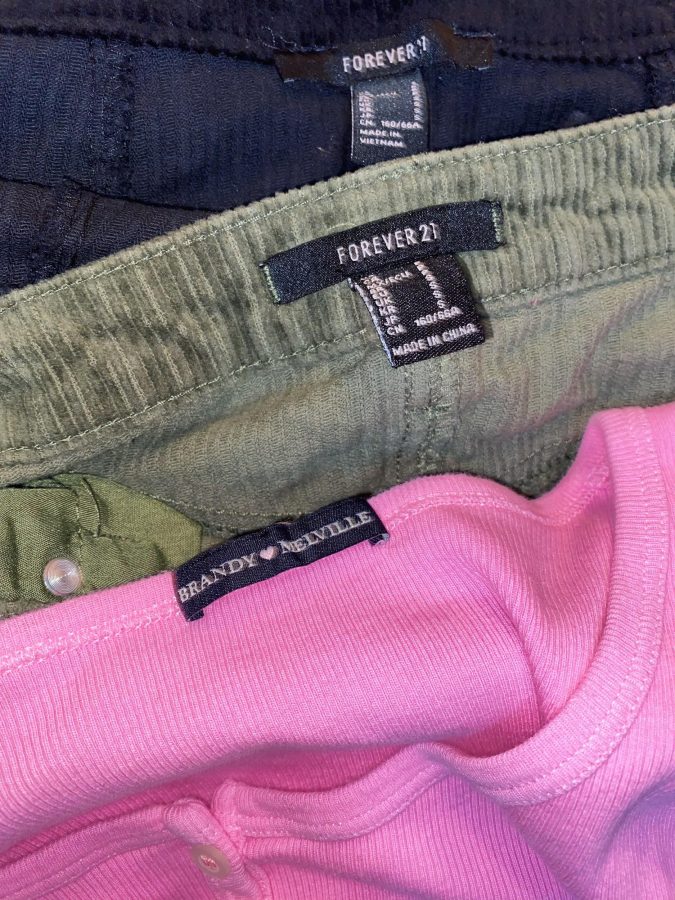Fast fashion is not worth the convenience
January 22, 2020
The enticing deals and trendy clothing of fast fashion lures in consumers at a cheap cost despite the expensive environmental and moral consequences. Ironically, these consumers tend to be the most progressive generation in modern times: Generation Z.
With immense youth climate change movements throughout the world led by teenage activists like Greta Thunberg, Generation Z has proven itself to be the most progressively environmentally conscious generation at this time. However, as movements grow stronger, the industry of fast fashion does as well, and at a costly price.
The disposable clothing of fast fashion holds a disturbing truth: In this industry’s factories, the people of developing countries—mostly women—endure brutal working conditions in tightly packed buildings for up to sixteen hours on end for unsubstantial wages. In the documentary “The True Cost,” Shima Akhter, a Bangladeshi garment worker, makes less than $3 a day in brutal working conditions. When she formed a union to demand improved working conditions, her bosses refused and physically abused her as well as those in it.
The harsh ethics of fast fashion are also replicated in the industry’s toll on the environment. According to Business Insider, 85 percent of textiles are burned or left in a landfill. Textiles that do not biodegrade, such as polyester, are used by the industry in order to decrease the price of production, but end up in the ocean. In 2017 alone, 35 percent of all microplastics came from synthetic textiles, according to a report from the International Union for the Conservation of Nature. Fast fashion has contributed enormously to carbon emissions as well, which only worsens the issue of climate change that Generation Z is tirelessly working to counteract.
If fast fashion holds these negative consequences, why does Generation Z, known for being rather progressive, feed into the industry?
Fast fashion is generally marketed towards teenagers. Fashion trends that arise on social media are replicated in cheap versions that the youth are attracted to. Teenagers and young adults struggle with educational debt, such as paying for college and standardized tests, as well as other financial burdens. Low prices on trendy clothing allows Generation Zealers to experience the desire of popular clothing, all while sticking to a low budget.
Social media also promotes fast fashion brands through popular influencers. Kylie Jenner, for example, has promoted Fashion Nova immensely; with Jenner’s growing following of 153 million on Instagram, the brand has become known to many of her followers. For the most part, these followers are young and heavily influenced by the celebrities that they follow on social media platforms. A single post promoting a fast fashion brand can bring in an influx of consumers the next day.
However, the promotion of sustainability by celebrities has also increased awareness surrounding fast fashion. Emma Watson has shown her advocacy for ethical fashion on different platforms such as popular fashion blogs. She greatly supports Good on You, a website that promotes ethical fashion and discusses the production behind a variety of brands. This website is beneficial in that it is also an app, so teenagers can easily use it to find sustainable brands to buy from, as well as discover the truths behind some of their favorite ones.
Unfortunately, the solution to fast fashion is not straightforward. But there are some options, such as promoting and using apps like Good on You. The high consumption and disposal of clothing can be reduced if consumers save their money and keep their clothing for longer. Thrifting is beneficial because it increases the longevity of trendy clothes at a low price, and it also allows consumers to recycle their used clothing. Most importantly, reducing the consumption of fast fashion is done most effectively through educating the youth. When discussing climate change and human rights, fast fashion should be mentioned as it contributes heavily to these issues. Generation Z can make change, but awareness of fast fashion must increase in order for change to occur.












